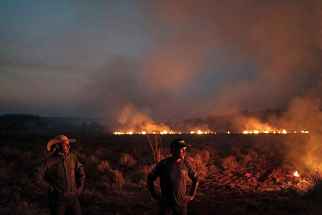Nursing revolt looms behind election campaign spin
Read this article for free:
or
Already have an account? Log in here »
To continue reading, please subscribe:
Monthly Digital Subscription
$0 for the first 4 weeks*
- Enjoy unlimited reading on winnipegfreepress.com
- Read the E-Edition, our digital replica newspaper
- Access News Break, our award-winning app
- Play interactive puzzles
*No charge for 4 weeks then price increases to the regular rate of $19.00 plus GST every four weeks. Offer available to new and qualified returning subscribers only. Cancel any time.
Monthly Digital Subscription
$4.75/week*
- Enjoy unlimited reading on winnipegfreepress.com
- Read the E-Edition, our digital replica newspaper
- Access News Break, our award-winning app
- Play interactive puzzles
*Billed as $19 plus GST every four weeks. Cancel any time.
To continue reading, please subscribe:
Add Free Press access to your Brandon Sun subscription for only an additional
$1 for the first 4 weeks*
*Your next subscription payment will increase by $1.00 and you will be charged $16.99 plus GST for four weeks. After four weeks, your payment will increase to $23.99 plus GST every four weeks.
Read unlimited articles for free today:
or
Already have an account? Log in here »
Hey there, time traveller!
This article was published 26/08/2019 (2296 days ago), so information in it may no longer be current.
Is there a nursing shortage or a nursing revolt? The provincial election campaign has proven beyond a shadow of a doubt nobody knows for sure.
Manitoba’s main political parties have been locked in a bitter dispute over the province’s supply of nurses and what should be done to ensure the health-care system has enough to operate at peak efficiency and effectiveness.
It’s turned into a pitched contest to see which party can spin the biggest fib.

The Progressive Conservatives, in general, refute the idea there is a shortage of nurses.
On Monday, the Tories claimed there are 300 more working in Manitoba now than when they took over government in 2016. Still, they promised to hire 200 additional nurses over the next four years as part of a $2-billion health-care pledge made earlier in the campaign.
There are many reasons to wince, but the first may be the sheer audacity of it all.
The Tories could not say where they would find 200 additional nurses. You could try to train them, but all of Manitoba’s training efforts have only provided enough new nurses to replace those who are retiring. It’s not clear how long it would take to bump overall numbers by 200.
Then there is the claim about how many nurses joined the provincial workforce: data from the College of Registered Nurses of Manitoba show there are not 300 additional nurses working in Manitoba since the Tories took over in 2016.
According to the official registry, which is current up to the end of 2018, there were 13,761 nurses practicing in the province — down by more than 100 from 2016.
The situation could have improved in 2019 (final numbers won’t be available until the end of December), but given the conflict around the Winnipeg hospital reorganization — which prompted an all-out war with the Manitoba Nurses Union — it’s unlikely the province has seen a net increase of 400 practising nurses.
That stance was buttressed by data released Monday by the NDP, showing there were 250 unfilled nursing vacancies in Winnipeg hospitals in March.
While the data is important to the overall debate over nursing levels, the NDP has been just as intellectually dishonest on the issue.
The NDP has also promised to hire more nurses, although it had the smarts not to identify a specific target number. The real dishonesty came when the party claimed its new data, obtained through a freedom of information request, showed the Tory government had “fired” 250 nurses.
As the Tory government restructured Winnipeg hospitals, and converted three city emergency departments to urgent care centres, it was obligated by contract to issue deletion notices to nurses who could not longer work at their current hospitals. The reorganization plan did not anticipate using fewer nurses; it did require the wholesale reassignment of hundreds of nurses from one hospital to another.
The recent data is also at odds with earlier claims by the NDP that the Tories “fired” 500 nurses as part of the restructuring of Winnipeg hospitals. If that were true, then certainly the vacancy numbers would have reflected a much larger number of open positions.
What is a voter to think about all this bluster and hyperbole?
You could start with the fact there is no conclusive proof of a nursing shortage. There is, however, abundant evidence Manitoba is experiencing a nursing revolt.
Certainly, fewer nurses are working in the hospital system right now. But when you account for the data from the College of Registered Nurses, what you see is a relatively stable, province-wide supply. That suggests fewer are willing or able to work within the reconfigured hospital system the Tories have designed.
More importantly, nurses, and the unions that represent them, have lost faith in the Tory government, which has imposed a wage freeze without any meaningful negotiation, and in the Winnipeg Regional Health Authority, which has overseen the hospital changes without any meaningful consultation with nurses.
A lack of faith and growing anger about the arbitrary nature of the changes has translated into nursing shortages in certain departments of certain hospitals.
No one, not even an iron-willed premier hell-bent on changing the health-care system, can force a nurse to uproot from one hospital and move to another.
In the labour market equation, nurses ultimately have the upper hand. Manitoba is not suffering under an oversupply of nurses. That simple fact means the next government will have to find ways of working with them — not against them — to fill in the gaps.
Unfortunately, if the tone and veracity of pledges is taken into account, the parties and politicians in this election have not demonstrated they understand the real problem. That makes it unlikely they have the capacity to find a solution.
dan.lett@freepress.mb.ca

Born and raised in and around Toronto, Dan Lett came to Winnipeg in 1986, less than a year out of journalism school with a lifelong dream to be a newspaper reporter.
Our newsroom depends on a growing audience of readers to power our journalism. If you are not a paid reader, please consider becoming a subscriber.
Our newsroom depends on its audience of readers to power our journalism. Thank you for your support.







